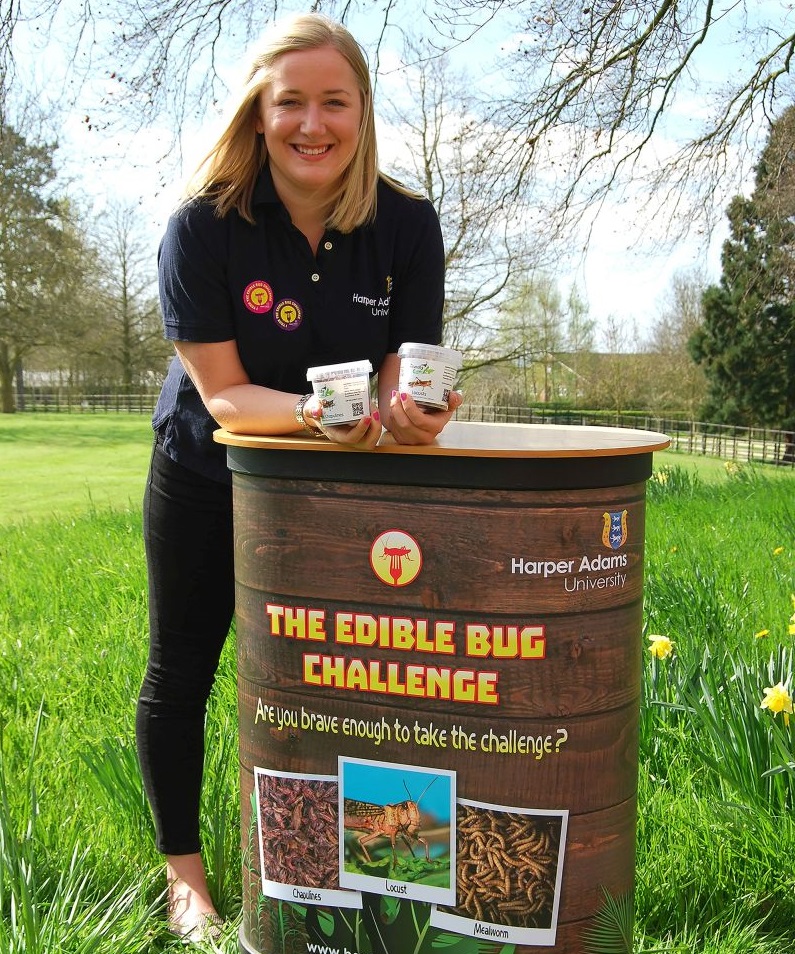
Forget ice creams and burgers, this summer’s agricultural show guests will be munching on mealworms and chomping on chapulines - thanks to the Harper Adams University Edible Bug Challenge.
At 10 shows throughout the UK and Ireland, including the Newport Show in Shropshire, visitors will face the challenge of tasting various insects prepared as snacks.
Harper Adams University Marketing Manager, Alex Hardie said: “Very few people know insects are an excellent, sustainable source of nutrition. Often high in protein, they’ll provide a vital food source for the planet in the future. Insects are, of course, widely consumed in other parts of the world – Europe has been slow to catch on.
“So, to help show visitors better understand the benefits of insects as a food source, we’re inviting people to sample three (small, medium and large) varieties of bugs: mealworms, chapulines and locusts. Those who successfully complete the challenge will be awarded an ‘I Took The Edible Bug Challenge’ sticker.”
The first stop for the Edible Bug Challenge is the Balmoral Show, Belfast, from May 13 to 15, followed by Royal Cornwall Show, Wadebridge, June 4-6; South of England Show, Haywards Heath, June 11-13; Royal Highland Show, Edinburgh, June 18-21; Lincolnshire Show, Lincoln, June 24-25; Royal Norfolk Show, Norwich, July 1-2; Newport Show, Newport, Shropshire, July 11; Great Yorkshire Show, Harrogate, July 14-16; Royal Welsh Show, Builth Wells, July 20-13 and finally, the Irish National Ploughing Championships, Co Laois, September 22-24.
MSc Entomology student Katy Dainton, who is studying insects as food, explained: “The practice of eating insects is called entomophagy. Humans have been eating insects for almost as long as they have been on the planet – there are more than 1,500 types of edible insect, including grasshoppers, ants, crickets, bees and wasps.
“About one third of the world population still eats insects, mainly in Latin America, Asia and Africa. Here in the western world we are not such big fans, but that is starting to change for reasons including global food security. The global population is already more than seven billion and it is growing all the time. For more people, we need more food, but we also face more climate change.
Fellow MSc student, Ceri Watkins, added: “Insects are very nutritious. They contain huge amounts of protein. Grasshoppers have roughly the same amount of protein as tuna steak or sirloin steak and locusts have much more fat that equivalent amounts of steak or tuna, which is great for storing energy in the body. Insects are also high in calcium, iron and zinc and could present a possible solution to the global food crisis.”
Alex Hardie added: “But first we have to conquer people’s fear and squeamishness – so pop along to the Harper Adams stand at one of the shows and give eating bugs a go. As well as earning bragging rights, you’ll be doing your bit to make sure future generations don’t go hungry!”
